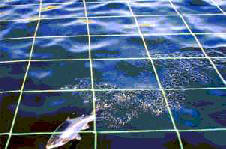|
EUROPEAN CETACEAN BYCATCH CAMPAIGN |
|
|
|
|
|
|
|
|
|
Salmon reared in cages around Scotland are contaminated with high levels of toxic chemicals suspected of causing cancer, according to an authoritative new study. The revelation has already sparked a call for consumers to boycott farmed fish. |
|
Experts from universities in Britain and Belgium have analysed salmon from Scottish fish farms and discovered that they contain a wide range of dangerous industrial pollutants. These include poisonous pesticides, cancer-causing PCBs (polychlorinated biphenyls) and 'gender-bender' chemicals known as PBDEs (polybrominated diphenyl ethers) which disrupt hormones. |
|
The contamination comes mostly from the food, particularly the fish oil, that the salmon are fed. Fish concentrate the pollutants, discharged by factories around the world over decades, in their fat. |
|
'While PCBs and many organochlorine pesticides have been banned throughout most of the world, they are still being delivered in the diet and European farmed salmon can be a significant source,' the scientists concluded. |
|
PCBs were used in transformers as lubricants and to soften plastic. They are very persistent compounds which are wide-spread in the environment and can damage the liver, the reproductive system and the immune system, as well as being suspected carcinogens. |
|
Chlorinated pesticides, used by farmers, can also damage the liver, the nervous system and the immune system, as well as being linked to cancers, while PBDEs are flame retardants and known 'endocrine disrupters' which may damage sperm. |
|
Anti-fish farm campaigners claim levels of contaminants in farmed fish are at least four times higher than those in wild fish. 'Consumers concerned about their health should steer clear of farmed salmon,' said Don Staniford, an environ mental consultant, author of a major critique of fish-farming. 'Factory-farmed salmon is a cheap and nasty product. It leaves a bad taste in the mouth.' |
|
The new study was carried out by Miriam Jacobs from the School of Biomedical and Life Sciences at the University of Surrey with two colleagues from the University of Antwerp. They claim their study is the first to examine the levels of these pollutants in the farmed salmon food chain and it has just been published in the scientific journal Environmental Science And Technology. |
|
They found 'relatively high concentrations of PCBs and moderate concentrations of organochlorine pesticides and PBDEs in farmed Scottish and European salmon'. As well as testing the fish , the researchers analysed the food they were fed, and the fish oil contained in the food (see table). This enabled them to trace the build-up of pollutants in the food chain. |
|
'While diets based on marine fish oils are currently favoured by the aquaculture industry, it is likely that these oils are contributing greatly to the contamination of farmed salmon by persistent organic pollutants,' they said. |
|
Environmentalists point out that the contamination of farmed salmon is so bad that the farms pollute the surrounding environment. An investigation by the Scottish Environment Protection Agency last year uncovered PCBs around 18 salmon farms on the west coast of Scotland. |
|
'This study finally confirms what we have long suspected -- that farmed salmon are accumulating elevated levels of known cancer-causing PCBs and other chemicals through eating contaminated feed,' said Kevin Dunion, chief executive of Friends of the Earth Scotland. 'Contaminant levels are now so high in some Scot-tish farmed salmon that levels of these chemicals can also be found in sediments immediately beside the cages.' |
|
Dunion pointed out that PCB levels in salmon were higher than in other farm animals. 'This is all the more worrying. The government must immediately step up its monitoring in farmed fish and work with the industry to rapidly eliminate these chemicals from all food stuffs,' he added. |
|
' All farmed fish products should be labelled to allow consumers to make an informed choice. When you combine PCBs with the cocktail of chemicals deliberately added to farmed salmon then it is hardly surprising that many in the industry are not exactly falling over themselves to amend their packaging.' |
|
The salmon farming industry, however, defends its reputation as a producer of healthy food. 'The benefits of eating oily fish as part of a healthy diet outweigh any disadvantages,' said Dr John Webster, the scientific advisor to Scottish Quality Salmon, which represents most salmon farmers. |
|
He criticised the study, which was based on samples taken in 1999, as being 'historical' and claimed concentrations of pollutants were very small. 'If you look hard enough for these things, you will find them,' he told the Sunday Herald. |
|
Every fatty food, including cheese and bacon, was contaminated, and salmon was only a small part of people's diet, he argued. Nevertheless, the salmon industry recognised that there was a problem with contamination that had to be addressed. |
|
Salmon farmers are now exploring the use of less polluted feed like vegetables oils, as well as investigating processes for removing pollutants , which are higher in fish caught in the Baltic than those caught in the south Atlantic. |
|
'The salmon farming industry isn't responsible for putting the contamination into the environment,' Webster added. 'Yet environmentalists are targeting us as the receivers of pollution but not those that put the bloody stuff in the environment in the first place.' |
|
|
